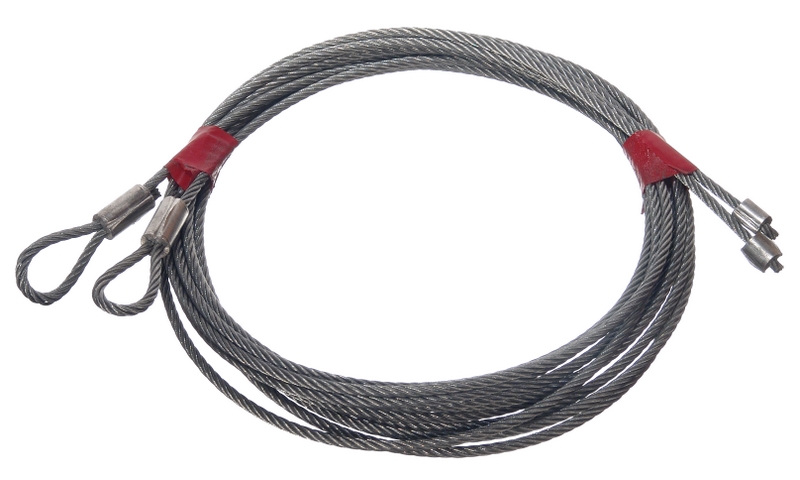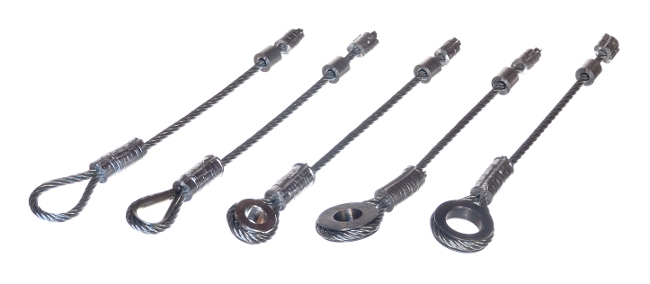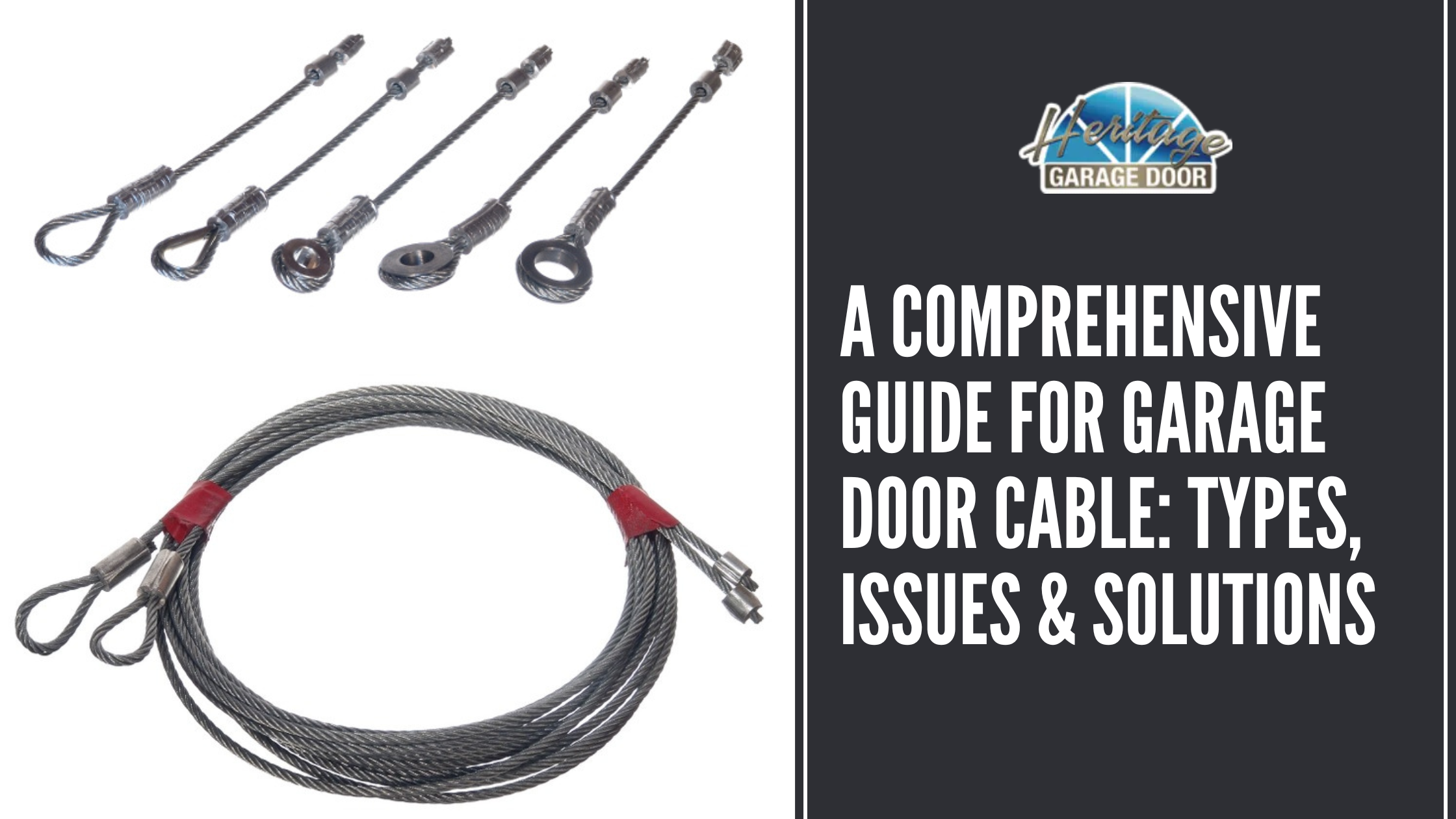
A Comprehensive Guide for Garage Door Cable 2024
The garage door is often the most overlooked when talking about maintenance and repair. It is a part of our homes that usually plays the role of giving security as its everyday function. A central part of the garage door system is the garage door cable. It has a great impact on the door’s performance depending on its type.
In this guide, we will delve more into understanding the various types of garage doors. This will help homeowners understand their garage door system more. You must be aware of the future issues your garage door cables may face and how you deal with them.
Choosing the Right Garage Door Cables

When choosing a garage door cable, it is not just about your preference. This decision will have a huge impact on the overall functionality of your garage door. It is important to be guided on the factors to consider when selecting the appropriate garage door cables to make an informed decision based on your needs.
Understanding Cable Types
There could be various types of garage door cables. Common examples include torsion spring cables and extension cables. It is best that you understand each of these types when choosing one. For instance, the torsion spring cables are ideal for heavy doors since they are known for durability and longevity. On the other hand, extension spring cables are often for lighter doors. Try to explore more about different types and examine their pros and cons.
Cable Thickness and Length
The cable’s thickness and length will depend on the weight and size of your garage door. Heavier doors will most likely require ticker cables for support. It is always best to ask for assistance from professionals to determine the cable size you need.
Material Quality
Garage door cables are usually made from galvanized steel. This material offers strength and resistance to rust. However, for homes exposed to a harsher environment, it is recommended to use a higher-grade material like stainless steel. This can also be a great investment for added durability.
Compatibility with Garage Door System
Always make sure that the garage door cable you choose is compatible with your garage door system. Mismatched cables can only cause future risks to garage door issues.
Safety Ratings
Quality cables are tested for their strength and durability. This will ensure that they can handle the operational stress of garage doors without failing. Choose a cable that meets or exceeds the safety standards.
Brand Reputation and Warranty
Opt for reputable brands known for quality and reliability. Additionally, check the warranty offered with the cables, as it can provide peace of mind and protection against defects.
Cost vs. Quality Trade-off
Your budget can be one of the factors to consider. Although never compromise the quality for the cost savings. Ask yourself if it’s worth it. You can always save yourself from future repair costs when you choose to invest in higher-quality cables.
Types of Garage Door Cables: Pros & Cons

Torsion Spring Cables
- Pros: This type of cable can handle significant weight which makes it ideal for heavier doors. It also brings stability and balance while the door is operating. This cable usually has a longer lifespan than other types.
- Cons: Torsion Spring Cables can be more costly than the other types. You will also need the assistance of a professional when installing or adjusting this type of cable. Lastly, this cable is not suitable for all types of garage doors, especially with limited overhead space.
Extension Spring Cables
- Pros: Extension Spring Cables are less expensive than the previous type. These are more common for residential garage doors. These can also be used for various types of garage doors and are easier to install.
- Cons: This cable type can be concerning in terms of safety when the spring snaps. Unlike the torsion springs, they do not have the containment feature. This would also most likely need frequent maintenance and has a shorter lifespan.
Safety Cables
- Pros: This type of cable is designed for added safety in that it prevents the spring from flying off if it breaks. With enough skills and knowledge, you can install it yourself. This also offers extra security to garage doors.
- Cons: Although this cable cannot stand alone. It should be used with extension spring cables. This would also require additional cost.
Custom Cables
- Pros: As the name suggests, this is a customized type of cable. It is made to meet the specific needs of your garage door. This also offers versatility that can be designed to suit unique garage door setups.
- Cons: This type of door would be more expensive because of the customization and may need a longer time to produce and deliver. So, you might need to wait before you can use it.
Common Issues with Garage Door Cables
Wear and tear
Just like any other components of a garage door, cables can also wear out over time. This can be due to many reasons, mostly from regular use or harsh weather.
Cable slippage
This can cause the garage door to appear misaligned. Usually, this is caused by improper tension, loose drums, or worn pulleys. This problem can also strain other parts of the garage door and cause further damage.
Cables snap
Cables snap because of excessive wear, overloading, or improper installation. This would mean your door cannot operate as well. This type of problem is more severe and would require immediate attention.
Rust and corrosion
Garage door cables are not safe from rust and corrosion. This can be due to high moisture or exposure to corrosive substances in the area. Not minding the rust would only lead to more issues.
Cables come off the drum
Cables come off the drum usually if the door experiences an impact, a spring failure, or if the cable was not wound correctly on the drum. When this happens, it will disrupt the door’s operation.
Common Solutions for Garage Door Cable Issues
Regular Maintenance
Routine maintenance may not be a solution but rather a primary prevention to many cable issues. This is not only limited to garage door cables but also the whole garage door system. Maintenance includes inspections, and lubricating the cables and associated mechanisms. This will ensure that everything is properly aligned.
Cable Replacement
This can apply to many garage door cable issues. Usually, this is the only option for some like worn or snapped cables.
Adjusting Cable Tension
Mostly a solution for slipped or loose cables. However, this task would require careful handling to ensure the door is balanced and operates smoothly.
Addressing Rust and Corrosion
When cables begin to rust or corrode, you can address this by cleaning and lubrication. This will help extend the cable’s life. However, for those with severe damage, it is better to replace them.
Rewinding or Realigning Cables
Rewinding or realigning cables can be a solution for cables that have come off the drum. Before doing this, make sure that you have enough understanding of how your garage door system fully works.
Pro Tip
Solutions can be made with DIY projects, although that is not always the case. There would be certain situations where more complex tasks are needed to be done. Garage door springs and cables are most likely considered as high tension components. Handling these is highly recommended to be left to the professionals. Complex repairs can be dangerous and would require proper tools and expertise.
Professional technicians have the knowledge and expertise that would also ensure safety. Especially when unsure, it is better to leave the diagnosing and addressing of problems to those who do this as a profession.
FAQs on Garage Door Cables
What are the cables on a garage door called?
The cables used in garage door systems are simply referred to as “garage door cables.”
How much does a garage door cable cost?
The cost of a garage door cable can vary depending on the type, material, and length. In general, prices can range based on the standard cables. However, this can also increase for custom sizes or higher-grade materials.
What size cable is used on garage doors?
The size of the cable would primarily depend on the weight and size of the door itself. Commonly, cable diameters range from 1/8 inch to 3/16 inch. However, the length and thickness will vary depending on the door’s specifications and the type of spring system in use.
Does a garage door need cables?
Yes, cables are an important part of the garage door mechanism. They work with the springs to lift and lower the door safely and smoothly. Without cables, the door would not be able to operate correctly.
What is the purpose of garage door cables?
The garage door cables are responsible for assisting in lifting and lowering the garage door. They help the springs provide necessary tension by balancing the door’s weight. The cables provide support for smooth and controlled garage door movement.
6. What do garage cables do?
Garage door cables transmit the force of the spring to the door, allowing the door to move up and down.
Conclusion
Garage door cables are very important to the safety and efficiency of garage door operations. It is also important that every homeowner is familiar with the different types of garage door cables and can understand the advantages and disadvantages of each. Moreover, the best thing is to be able to recognize the possible issues that are commonly encountered with garage door cables and how to address them.
Knowing how to choose the right cables, considering various factors, is a very crucial step to ensure smooth operation and longevity of the door. It is the responsibility of every homeowner to be informed of the proper care and maintenance of their garage doors.



